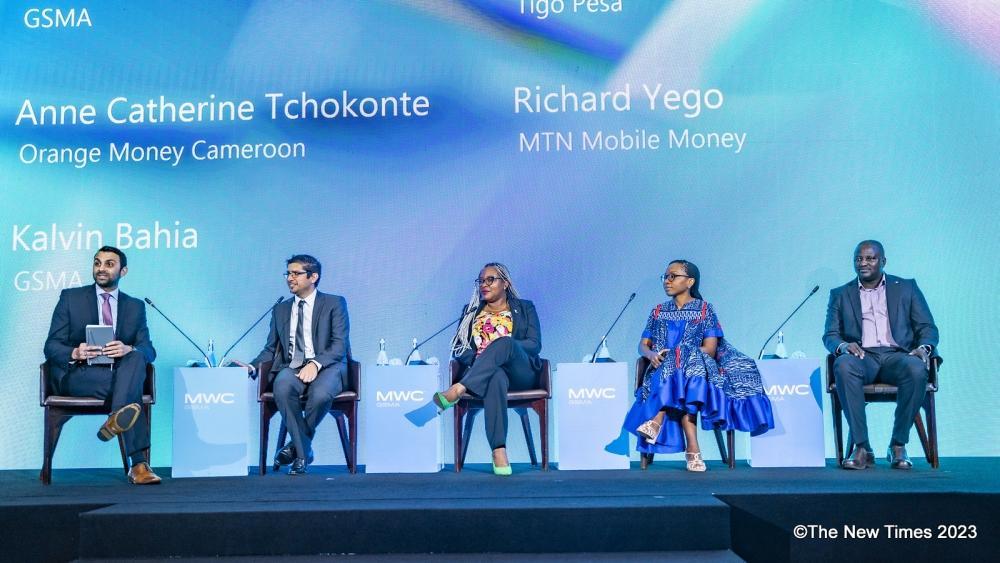Nadia Lobti
Africa-Press – Rwanda. In a discussion at the Mobile World Congress in Kigali on Thursday, October 19, industry leaders zeroed in on the enormous impact of mobile money adoption on economic development, poverty reduction, and social equity in Africa.
The Global System for Mobile Communications Association (GSMA) 2023 study reveals that between 2013 and 2022, the number of registered mobile money users surged from 200 million to 1.6 billion, marking an eight-fold increase. This growth, it was highlighted, was largely concentrated in Sub-Saharan Africa, particularly in East and West Africa.
By 2021, about one-third of adults in Sub-Saharan Africa had access to a financial institution through mobile money.
As adoption has risen, so has the value of mobile money transactions. What was a $100 billion industry in 2013 ballooned to an astonishing $1.26 trillion in 2022. This translates to nearly $2.4 million transacted every minute in 2022.
Delegates follow a panel discussion on the enormous impact of mobile money adoption on economic development, poverty reduction, and social equity in Africa at the Mobile World Congress in Kigali on Thursday, October 19
“I’ve been up here talking for roughly two minutes, so that means about $5 million in mobile money transactions since I started. It’s quite remarkable, and the numbers are likely even higher today in 2023,” said Ashley Olson Onyango, Head of Financial Inclusion and AgriTech at GSMA, a global organisation unifying the mobile ecosystem to discover, develop and deliver innovation that helps business and society thrive.
While the link between financial inclusion and economic growth has been acknowledged, less was known about the effect of digital financial inclusion, especially in the context of mobile money. To address this knowledge gap, Kalvin Bahia, Principal Economist at GSMA Intelligence, assessed the impact of mobile money on GDP by leveraging a rich dataset spanning a decade.
“In 2022, all mobile money-enabled countries collectively contributed over $600 billion, marking a 1.5% GDP increase,” Bahia said.
Sub-Saharan Africa excelled, adding more than $150 billion to its GDP, a 3.5% growth.
Eastern Africa’s influence exceeded $60 billion, resulting in an impressive 5.9% growth. Western Africa also made a substantial impact, contributing over $70 billion and achieving a 4.1% GDP increase.
These figures underscore how mobile money, through rapid technological advancements, can bring about significant progress for developing countries, promoting economic growth even in the absence of robust physical infrastructure.
Although mobile payments are gaining popularity, numerous obstacles must be addressed to facilitate widespread adoption. The acceptance of mobile payments hinges on a blend of demographic factors and the advancement of technology.
Central Africa is trailing behind in the adoption of mobile money accounts in comparison to East and West Africa.
“East Africa boasts 400 million customers with accounts, while Western Africa has approximately 300 million, which contributes to what I refer to as the local financial ecosystem. On the other hand, Central Africa lags behind with roughly 65 million,” explained Anne Catherine Tchokonte, CEO of Orange Money in Cameroon.
Tchokonte pointed out that this issue is worsened by outdated legislation, inadequate enforcement capabilities, as well as a lack of financial inclusion for the millions who don’t have access to mobile money services.
Angelica Pesha, CEO of Tigo Pesa, and another panel member, suggested that countries could make a financial inclusion leap by fostering partnerships and cooperation among mobile money providers, financial regulatory bodies, and government entities.
“Distinguishing between manual rules and embracing new biological approaches is tough to clarify. In my opinion, this scenario gives essential advice, highlighting that these new biological approaches should undergo scrutiny and provide proof when we explain our case to people outside of the telecom and banking fields,” Pesha said.
An illustrative example is taxation, where we’ve observed how an increased reliance on financial system usage can depoliticize the issue, offering a foundation for regulation. “Having all stakeholders, especially government entities, working in unison is of utmost importance,” she added.
The panellists also emphasized the importance of educating and simplifying services to make them accessible to a broader population.
For More News And Analysis About Rwanda Follow Africa-Press






